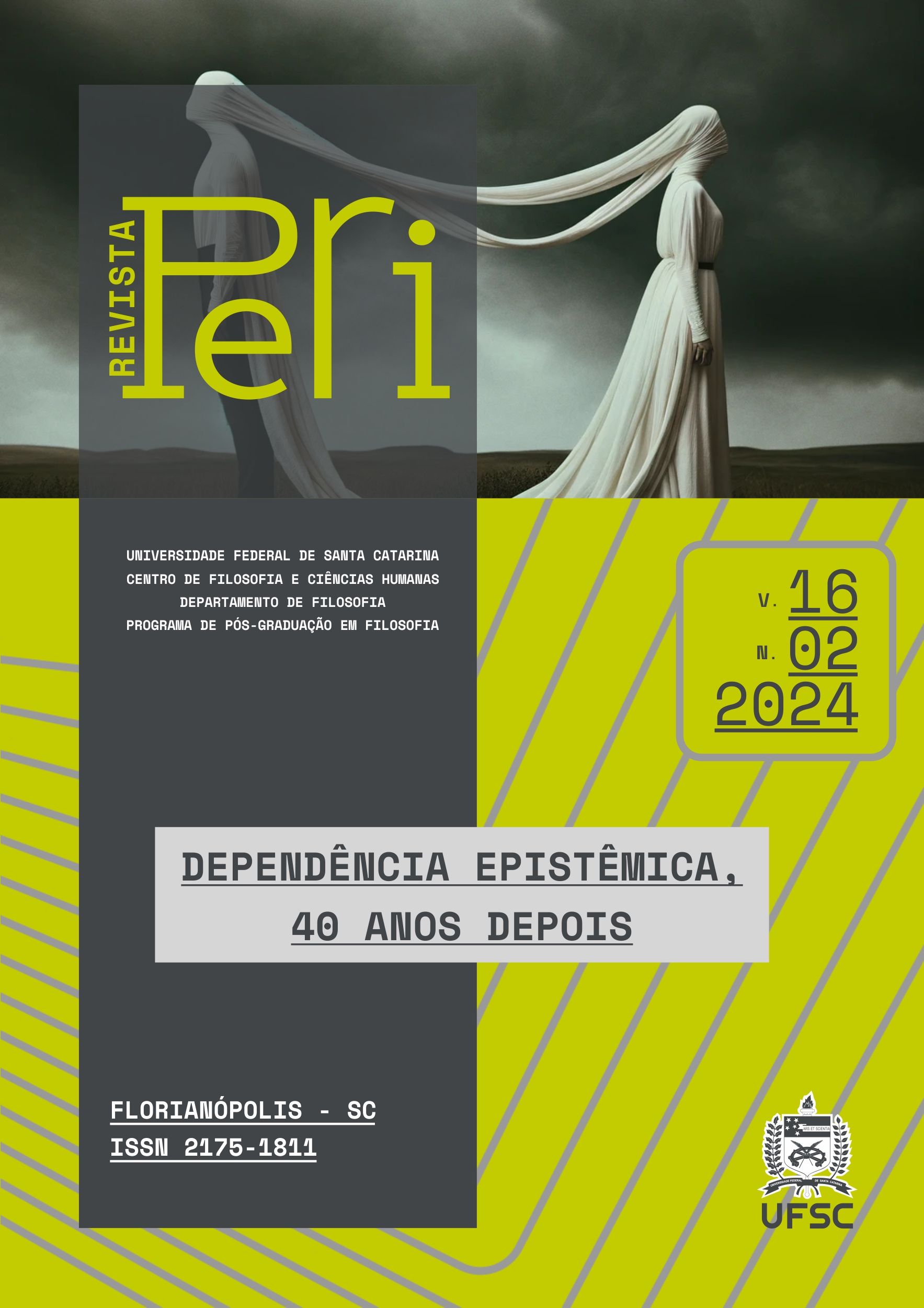Disagreement and Deference to Experts
Independence or Qualified Numbers?
Keywords:
peer disagreement, deference to experts, expertise, independence, testimonyAbstract
The aim of this paper is to provide an overview of the debate regarding the Independence Belief principle and to investigate whether a novice’s deference to the majority opinion is rational. In the first section, we introduce the Independence Belief principle and some key definitions from the epistemology of expertise. In the second section, we explain Alvin Goldman's (2001) argument in defense of a version of the Independence Belief principle. In the third section, we explore both David Coady’s (2006, 2009) criticisms of Goldman’s argument and the argument from Jennifer Lackey (2013) against that principle. In the final section, we discuss Zach Barnett’s (2019) response to Lackey’s conclusion and his reflections on belief dependence.
References
BARNETT, Zach. Belief dependence: How do the numbers count? Philosophical Studies, v. 176 (2), p. 297-319, 2019.
BRADDOCK, Matthew. Resuscitating the Common Consent Argument for Theism. International Journal for Philosophy of Religion, v. 93 (3), 2023, p. 189-210.
CHRISTENSEN, David. Conciliation, Uniqueness, and Rational Toxicity. Noûs, 50 (3): p. 584-603, 2014.
COADY, David. When experts disagree. Episteme, v. 3 (1-2), p. 68-79, 2006.
COADY, David. What to Believe Now: Applying Epistemology to Contemporary Issues. Malden, MA: Wiley-Blackwell, 2012.
ELGA, Adam. How to Disagree about How to Disagree. In FELDMAN, Richard Feldman; WARFIELD, Ted. (Eds). Disagreement. Oxford, GB: Oxford University Press, 2010, p. 175–186.
ELGA, Adam. Reflection and disagreement. Noûs, v. 41 (3), p.478–502, 2007.
ETCHEVERRY, Kátia Martins. O novato e a disputa entre Especialistas: um problema para a epistemologia social. In MULLER, Felipe.; RODRIGUES, Tiegue Vieira (Orgs.). Epistemologia Social: Dimensão Social do Conhecimento. Porto Alegre, RS: EDIPUCRS, 2012, p. 69-84.
FETT, J.R. Anuladores. In OLIVEIRA, Rogel Esteves de; ETCHEVERRY, Kátia Martins; RODRIGUES, Tiegue Vieira; SARTORI, Carlos Augusto (Orgs.). Compêndio de Epistemologia. Porto Alegre, RS: Editora Fi, 2022, p. 23-31.
GELFERT, Axel. A critical introduction to testimony. Sydney (Australia): Bloomsbury, 2014.
GOLDMAN, Alvin I. Experts: Which ones should you trust? Philosophy and Phenomenological Research, v. 63 (1), p. 85-110, 2001.
HARDWIG, John. Epistemic dependence. The Journal of Philosophy, v. 82 (7), 1985, p. 335- 349.
KELLY, Thomas. Consensus Gentium: Reflections on the 'Common Consent' Argument for the Existence of God. In CLARK, Kelly James; VANARRAGON, Raymond J. (Eds.). Evidence and religious belief. New York: Oxford University Press, 2011, p. 135–156.
KELLY, Thomas. Peer Disagreement and Higher‐Order Evidence. In FELDMAN, Richard Feldman; WARFIELD, Ted. (Eds). Disagreement. Oxford, GB: Oxford University Press, 2010, p. 111–174.
LACKEY, Jennifer. Disagreement and Belief Dependence: Why Numbers Matter. In CHRISTENSEN, David; LACKEY, Jennifer (Eds). The Epistemology of Disagreement: New Essays. Oxford: Oxford University Press, 2013, p. 243-268. https://doi.org/10.1093/acprof:oso/9780199698370.003.0012
MATHESON, Jonathan. The Argument from Common Consent. In RULOF, Colin; HORBAN, Peter (Eds.). Contemporary Arguments in Natural Theology: God and Rational Belief. Bloomsbury Publishing, 2021, p. 293-309.
MIGUEL, Felipe (2020). The Epistemic Significance of Agreement with Exceptional Theistic Philosophers. Faith and Philosophy: Journal of the Society of Christian Philosophers, v. 37, 2020, p. 451–474. DOI: 10.37977/faithphil.2020.37.4.5
ROCHA, Lennon da Silva & MÜLLER, Felipe de Matos. Testemunho e Expertise. In MÜLLER, Felipe de Matos; ETCHEVERRY, Kátia Martins (Orgs.). Ensaios sobre epistemologia do testemunho. Porto Alegre, RS: Editora Fi, 2017, p. 79-101.
SMITH, Julia. Philosophical Agreement and Philosophical Progress. Episteme, p. 1-19, 2024.
Downloads
Published
Issue
Section
License
Copyright (c) 2025 Eduardo Alves, Vinícius Felipe Posselt

This work is licensed under a Creative Commons Attribution-NonCommercial-ShareAlike 4.0 International License.
1. Autores mantém os direitos autorais e concedem à revista o direito de primeira publicação, com o trabalho simultaneamente licenciado sob a Creative Commons Attribution License que permite o compartilhamento do trabalho com reconhecimento da autoria do trabalho e publicação inicial nesta revista.
2. Autores têm autorização para assumir contratos adicionais separadamente, para distribuição não-exclusiva da versão do trabalho publicada nesta revista (ex.: publicar em repositório institucional ou como capítulo de livro), com reconhecimento de autoria e publicação inicial nesta revista.
3. Autores têm permissão e são estimulados a publicar e distribuir seu trabalho online (ex.: em repositórios institucionais ou na sua página pessoal) a qualquer ponto antes ou durante o processo editorial, já que isso pode gerar alterações produtivas, bem como aumentar o impacto e a citação do trabalho publicado (Veja O Efeito do Acesso Livre).






